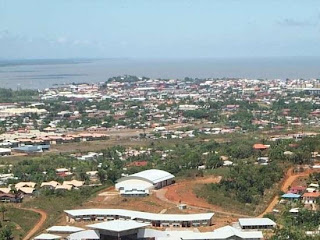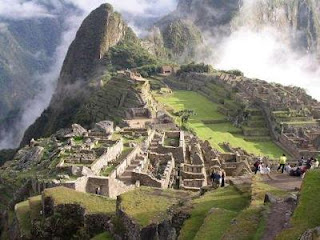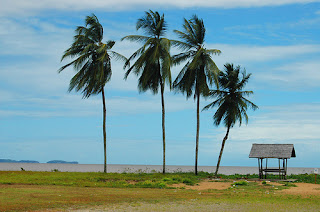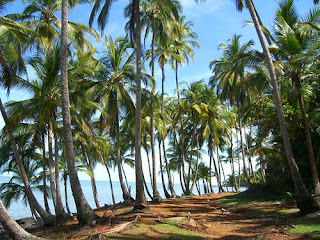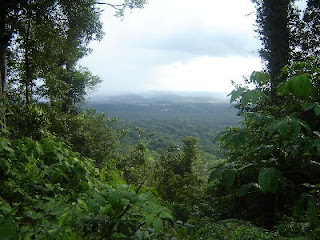When looking at the map of South America many noticed something odd a small but noticeable chunk of the continent about the size of South Carolina belongs to France sure it's not odd to consider that the French had been there before nearly all of the Americas was once European territory after all and sure all of these former colonial empires still retain small overseas territories but what's the story behind France retaining such a large piece of their former empire throughout decolonization into the modern-day the territory is called French Guiana or the territorial collectivity of French Guiana it borders brazil and Suriname and is a full-on French territory it is one of the five Guyana's which make up the Guiana shield Spanish Guiana in modern-day
Venezuela the country of Guyana which once belonged to Britain Suriname once Dutch Guiana and Tampa Portuguese Guiana today a part of brazil Guyana Suriname and French Guiana stick out compared to the rest of South America as they are in fact not exactly part of Latin America like the rest of South America is why well let's begin at the beginning France was a major player in colonizing the Americas in the 17th and 18th centuries ruling a huge swath of territory which today is a part of Canada and the united states the small but important region that became Haiti and many other territories though Spain who I'm doing a documentary about right now and Portugal dominated south America throughout this time France and other Europeans, in fact, were able to fit in here as well the French were interested in the area from as early as 1504 French settlement of the area commenced in 1604, however, their rule was to prove unstable as they would have to contend with Portugal England
The Dutch indigenous tribes and debilitating diseases like malaria and yellow fever throughout the century which hindered attempts at setting up a permanent French presence the area was initially regarded as Portuguese due to the treaty of tortoises and though the Portuguese would attempt to thwart French efforts to colonize the area they made little effort to colonize the area themselves viewing the area as comparatively poor and inhospitable which made it only a matter of time until someone else succeeded in taking it in the 1620s the ruan commercial company established the settlement of cinematic in 1643 the French were able to establish a permanent settlement at cayenne which was named after the peppers in the region not vice versa actually as France fought with Europe throughout the 17th century during the reign of louis xiv especially the territory changed hands a few times with the Dutch and English the English seized the territory in 1667 but returned it that same year with the treaty of bread which ended the second anglo-dutch war recognizing French ownership the Dutch again briefly occupied the territory in 1676 but soon returned to France following this occupation the territory would remain firmly French the Dutch meanwhile would control their own piece of south America right next to French Guiana
The aforementioned Suriname which under the care of the Dutch West India company would be more successful than France the British would take their slice of Guyana much later the French used the colony to grow sugar coffee indigo and other warm-weather crops however this was more difficult here than it was in many other warm regions colonized by France because of the area's notoriously poor soil the French quickly began importing African slaves to the region to work on the plantations these slaves always outnumbered the white settlers quite significantly which made room for the occasional rebellion more commonly however slaves would escape to live in a nearby jungle forming their own communities or sometimes even mixing in with the native Americans these escaped African slaves who formed their own communities were called here and elsewhere maroons as the maroon communities which often consisted of full-blooded Africans developed they and the European colonists would often harass each other the same process occurred in next-door.Suriname the French did not put a great amount of effort into colonizing Guyana compared to other areas namely Haiti and mainland north America they attempted to change this in the middle of the 18th century when the French were defeated in the French and Indian war in 1763 following this war France lost the majority of its north American territory and though it retained island territories like Haiti French Guyana was its last large American territory king louis xv attempted to make up for these French losses by encouraging development and emigration to the colony but this was a failure only around 4 000 of the original 14 000 sent to the colony survived of whom most decided to leave to move to surrounding islands with disease and native Americans posing too great of a threat the French once again lost interest and the weak willed louis xv couldn't convince them otherwise thus the bourbons would not make much of Guyana but the republic after the revolution of 1789 would find a use for it they had the idea to turn the notoriously dreadful area into a penal colony that is to say a place to transport and resettle prisoners including political enemies who were spared the guillotine they began doing this sometime between 1792 and 1795. for most prisoners throughout the 18th and 19th centuries, it was not much of a better alternative to execution indeed exile to French Guiana was later called the dry guillotine soon Napoleon took over France and had less interest in the Americas after losing Haiti this allowed the Portuguese to take over the territory in 1807 with British assistance which they occupied until napoleon's defeat in 1815. afterward, it was restored to France slavery was brought back temporarily under napoleon and would last in French Guiana until 1848.
once slavery was abolished for good the plantations of Guyana struggled without slave labor many Africans left and joined the communities established by the maroons in the jungle these communities would form a kind of buffer between the European coast and the Amerindian interior life in these communities closely mimicked the lifestyles and cultures found in the African lands from which they had been taken and fascinatingly still do with the lack of free labor the French decided to try to import immigrants who could provide cheap labor from china India and other parts of Asia this too failed however as the immigrants preferred to reside and work in the city of cayenne rather than work on the plantations thus the plantations slowly reverted to jungle the settlement of people from numerous areas of the world which occurred in the nearby regions as well has made the Guyana's one of the most ethnically diverse places on earth to this day in 1852 during the reign of napoleon iii the French began to re-emphasize Guyana's use as a penal colony they were in part inspired by Australia which had gone from a British penal colony in a harsh environment to a great success Australia had after all become essentially an expansion of Britain napoleon iii passed laws requiring prisoners to remain in the area for some time after their sentence sometimes permanently for the purpose of developing it former prisoners would then be given land on which to settle with the size and location varying depending on what crimes they had committed the French penal system in Guyana however would be yet another failure a far cry from Australia's success between 1852 and 1953 as much as 75 of the 70 to 80 000 convicts sent to French Guyana would die in the infamous bunya decayed or the cayenne pinot colony better known as the il du diabla the devil's island penal colony.There were multiple prison locations on the mainland and on the nearby salvation islands which in fact held more prisoners but devil's island was the most famous indeed the penal colony itself which was intentionally brutal became one of the most famous in history the prisoners who were ordered to colonize the area after the completion of their sentences were often released into conditions which were not much better than those which they experienced in the prisons often being forced to return to a life of crime to avoid death from disease or starvation for as long as possible public attention was not drawn to these circumstances until the imprisonment of the famous Alfred Dreyfus in 1895 the French began to close the penal colonies in 1938 and finished in 1953. in the 1860s the fact that a clear border with brazil and with Suriname as well had never been established became an increasingly pressing issue as gold was increasingly discovered in the area in 1862 it was declared that the area between the amazon and oyapog rivers was to be in neutral territory in 1886 taking advantage of this ambiguous situation a state was formed in this neutral territory called the republic of independent Guyana or more simply kunai after its primary city neither France nor brazil recognized the country and it fell apart within five years the border dispute was mostly ignored apart from this until 1894 when gold was discovered in a neutral region as well brazil tried to set up their own independent puppet state in the region but the French forbade this temporarily until it was awarded to brazil in negotiations mediated by Switzerland in 1946.French Guiana obtained the status of an overseas department of France a department is a sub-component of a region which is a lot like a state or province in 2015 this status was changed again and it was given special status as a territorial collectivity to accommodate calls for increased autonomy despite this desire for increased autonomy support for independence itself is low having briefly reviewed the history of the region it hopefully is easier to see why ironically France seems to have retained the region in part because it was not very successful in developing it for example firstly the population is quite small the region itself is the size of Austria but has 1 30th the population of Austria sitting at less than 300 000 people furthermore despite its size the vast majority of the area remains undeveloped and difficult to access forest about 99 of the region is forested in fact a significant portion of which has never been touched by mankind these forests isolate the Guyana's from the rest of south America which is part of why they have more in common with the Caribbean where France still owns territory as well furthermore the many different communities of the area have a history of poor relations with each other which has helped to hinder a feeling of unity that would lead the people of this region towards nationhood this has been one of a number of obstacles that nearby British Guyana and Suriname have had difficulty overcoming since their independence the problem Suriname especially has faced since its independence such as internal violence mass emigration to the Netherlands and more have been witnessed firsthand by French Guiana likely encouraging anyone seeking independence to take it slow if at all the lack of development.In the area has made the region fairly economically dependent on France much of the economic activity that is present in the area such as that which comes from the presence of the Guyana space center depends on maintaining its current relationship with France finally it's important to note that and this may be the most important factor despite frustration with the French government the people of French Guiana do have greater representation in France than did the subjects of many other territories of the other European empires accordingly French Guyana does not see itself as a colony but rather an overseas region of France and it is treated as such a rough comparison might be the American states of Alaska and Hawaii regions which sort of began as colonies but are now full parts of the united states with representation and their own say in the direction the country takes French Guiana was decolonized in the eyes of many French and French Guianas it simply chose to remain a part of France and thus though the locals of this region often claim to be frustrated with the French government they tend to push for greater assistance rather than separation.
